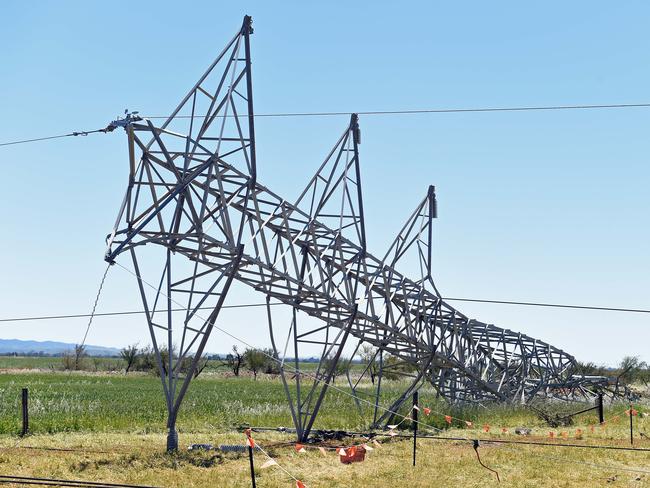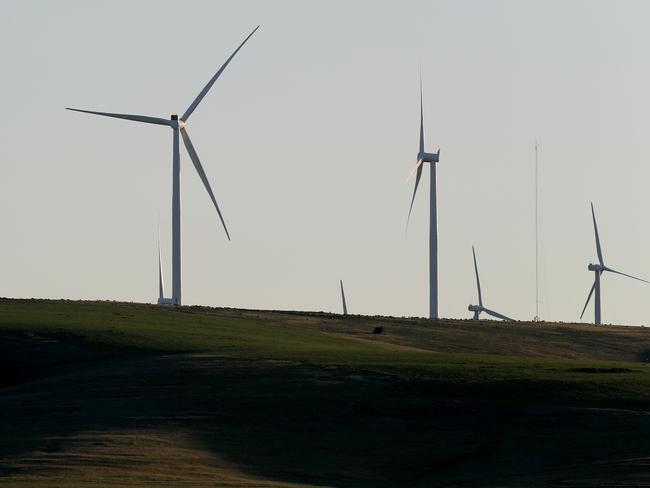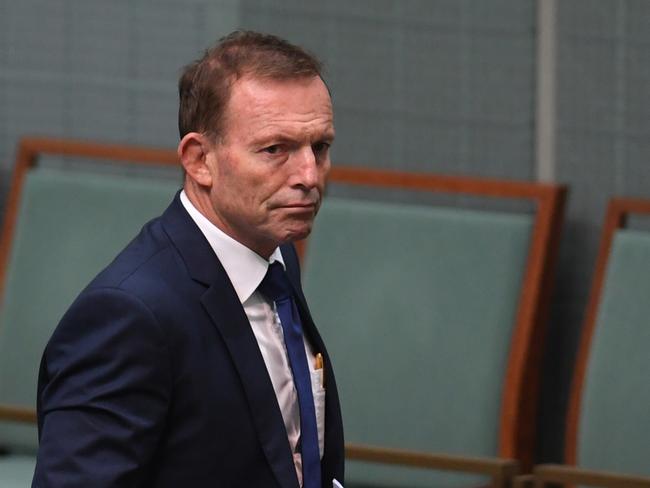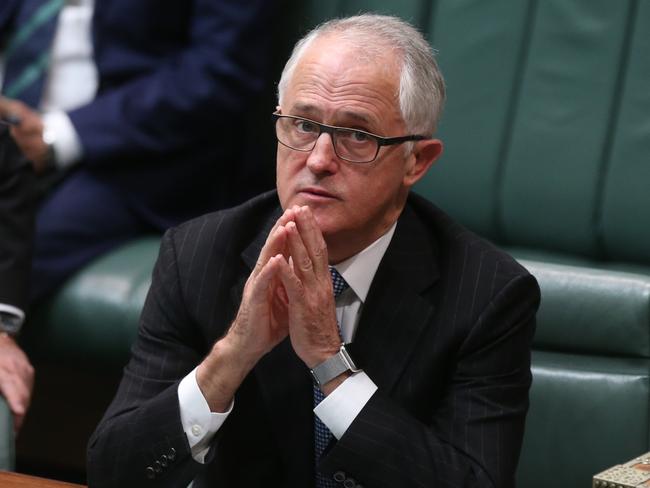Can Australia afford to ignore the Finkel report?
THE backlash has begun against the plan to fix Australia’s looming energy crisis but with power prices rising and warnings of blackouts, can we afford to ignore it?

THE plan to fix Australia’s looming energy crisis already looks doomed but can we afford to do nothing?
Australians are already paying more for electricity, there’s warnings of more blackouts and the country is struggling to cut emissions.
Chief Scientist Alan Finkel’s suggestion for fixing the country’s problems has sparked a backlash within the government, particularly over the future of coal.
“Finkel in its current form is dead,” one MP told The Australian after a three-hour coalition party room meeting yesterday.
About 20 MPs are believed to be opposed to Finkel’s proposal, with former prime minister Tony Abbott believed to be one of the fiercest critics.
There is already a sense of deja vu, with Abbott describing the proposal for a clean energy target as “effectively a tax on coal”, even before he had read the report — according to the AFR.
“We all know that there is no such thing as a magic pudding,” Mr Abbott told 2GB radio on Monday.
“If you are rewarding one type of energy, inevitably that money’s got to come from somewhere, either from consumers or taxpayers, and if it’s from consumers, well it’s effectively a tax on coal, and that’s the last thing we want.”
Another MP told Fairfax that “Malcolm (Turnbull) could lose his leadership over this if he doesn’t listen to us”.
Prime Minister Malcolm Turnbull had earlier sought to reassure sceptical colleagues he would take a pragmatic approach, compared with Labor’s ideological commitment to an emissions intensity scheme and its 50 per cent renewables target by 2030.
Finance Minister Mathias Cormann has said doing nothing would cost consumers even more.
“The biggest cost ... tax that we could impose on consumers and taxpayers will be to do nothing,” Senator Cormann told ABC radio on Tuesday, noting electricity prices were projected to go “up, up and up” without changes.
Senator Cormann says the Finkel review is a once-in-a-generation opportunity to sustainably transform the nation’s energy policy framework.
So, should we take the leap?
WHAT’S IN IT FOR ME?
Under his plan, Dr Finkel said households could save $90 a year and businesses even more if his new national energy plan is followed. It will also reduce the likelihood of blackouts and ensure carbon emissions are cut.
Dr Finkel said energy costs would be 10 per cent lower under his plan.
It is understood large industrial users could pay around 20 per cent less per year.
THE BIG PROBLEM
A statewide blackout in South Australia highlighted the importance of having a secure supply of electricity, with businesses saying the event in September cost them $367 million.
There’s also been warnings of future electricity shortfalls in South Australia, NSW and Victoria unless gas production is boosted.
“The goal is to ensure we have a secure electricity supply, at an affordable price for all Australian consumers, while meeting our international obligations to lower emissions,” Dr Finkel said.
Despite not adopting the “great big new” carbon tax, energy prices in Australia have continued to rise.

Real electricity prices were fairly stable until the mid-2000s, according to a Grattan Institute report, but then began rising rapidly by about 50 per cent in mainland capitals. They jumped another 30 per cent during the two years the carbon price was in place before falling slightly after it was axed.
But since then prices have started rising again and analysis from the Climate and Energy College, commissioned by the Greens, found wholesale prices have doubled since the carbon tax was dropped.
Part of the problem is the price for gas — seen as the best low emissions source of baseload power — has skyrocketed partly because Australia is now selling a lot of gas overseas.
Crossbench senator Nick Xenophon warns Australia could find itself in a recession if rising gas prices aren’t addressed.
“Unless we tackle this head on and get a result we will be seeing our economy going into recession given the number of jobs that will be lost in the next 12 months,” Senator Xenophon told ABC radio.
WHAT WOULD WE HAVE TO DO?
Dr Finkel released his blueprint on Friday to make Australia’s electricity system more secure and reliable while continuing to lower emissions.
It included several recommendations but the one measure that has everyone talking is his idea for a Clean Energy Target (CET) that would provide incentives to encourage new wind, gas and other low emissions generators to enter the market.
The CET would replace the existing renewable energy target in 2020, but to be most effective would need the states and territories to axe their own targets.
It would require a proportion of electricity each year to come from generation below a set emissions level.
Governments would set the threshold, with electricity generators able to get certificates for power they produce under that level.
The target is expected to encourage investment and improvements in the electricity system.
But there are already concerns that the reforms would block new “clean coal” projects if the threshold was set too low as they wouldn’t be eligible for incentives.

IS IT ALREADY DOOMED?
Supporters of coal say the threshold for the Clean Energy Target should be set high enough to include “clean coal”.
But the Greens don’t believe coal can be clean.
“The idea that coal in any way can be associated with clean energy is simply fantasy,” Greens senator Nick McKim said.
Labor has also rejected the idea of setting a target by boosting coal-fired power.
“It’s simply an oxymoron, it’s a contradiction in terms and I am concerned that Barnaby Joyce and Tony Abbott appear to be setting that as a pre-condition for the government adopting the recommendations of Dr Finkel,” Labor climate spokesman Mark Butler said.
But Mr Butler said the opposition would carefully consider the report and seek to work with the government on a bipartisan energy policy.
Unfortunately there’s also rebellion among government ranks.
Liberal backbencher Craig Kelly wants a fresh review to be done on the effects to the economy and also said he did not support a benchmark emission target of 0.6 tonnes per megawatt hour — the level used by Dr Finkel to model economic effects.
However, Mr Kelly told ABC on Wednesday he was willing to back a clean energy target if there were moves to boost stored power that could be used on demand.
“We need to get that sorted, on dispatchables. Otherwise, we’re going to see problems with the electricity supplies come this summer,” he said.
About 20 MPs - including former prime minister Tony Abbott - expressed misgivings during the meeting, another 10 were broadly supportive, while the remainder were noncommittal but asked questions.
Opposition Leader Bill Shorten said the clean energy target was a sensible proposal that should have been taken seriously.
“For goodness sakes Malcolm Turnbull, get your government into order because Australian’s deserve lower electricity prices, more jobs in renewable energy and of course a real fair dinkum policy on climate change,” he told reporters.

Energy Minister Josh Frydenberg played down suggestions of a backlash, saying the meeting was a valuable discussion and emphasising cabinet had made no decisions on the review.
“Certainly, people are concerned about the future of coal - rightly so, too,” he said.
“They understand that coal is a critical source of base load power. Under Dr Finkel’s recommendations, it would still provide more than 50 per cent of the power across the national electricity market by 2030.”
WHAT ABOUT CLIMATE CHANGE?
There’s also criticism that the report doesn’t go far enough in addressing emissions reduction.
Climate Council chief executive Amanda McKenzie said the report doesn’t decrease emissions as far as they need to be and should do “far more on coal”.
She insisted Australia needs to have “well over 50 per cent” renewables by 2030.
According to Dr Finkel’s plan, coal would still provide 53 per cent of Australia’s power by 2030.
Gas would provide five per cent and the remainder would come from renewables such as large-scale solar, rooftop solar and wind.
Dr Finkel believes this would provide a “credible mechanism” to enable Australia to achieve its Paris agreement commitment of a 26 to 28 per cent reduction in 2005 emissions by 2030.
But Greens leader Richard Di Natale has been scathing of Dr Finkel’s plan, which he says will leave Australia generating power from coal and gas until 2070.
“The problem is that because the climate debate has been so toxic I think there’s a sense that any plan is better than nothing,” he told ABC radio.
THE ONLY WAY FORWARD
Australian Energy Council chief executive Matthew Warren cautioned the only way forward was to have bipartisan support for the final policy position.
“The crossbenchers in the Senate and minor parties can hold views and that’s fine, but it’s really about both Labor and the Coalition getting together and working out what they can do to co-manage reinvestment in this sector,” he told ABC radio.
Mr Wood said the clean energy target would set up a framework that could be used to address whatever environmental targets were made in the future.
“If Labor was to be elected at the next election they could take this model, they could crank it up without virtually any changes whatsoever to meet their own targets,” he said.
After many years of nasty and divisive debate, it’s clear agreement on a policy to provide secure power in Australia at the lowest possible prices is long overdue.




